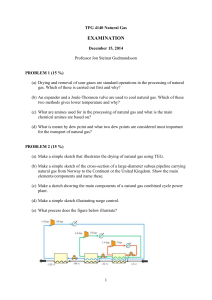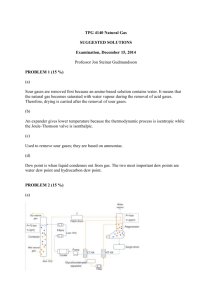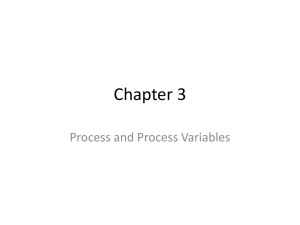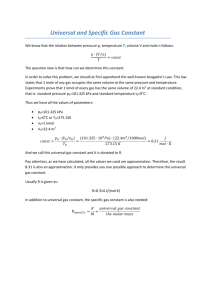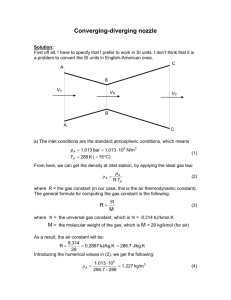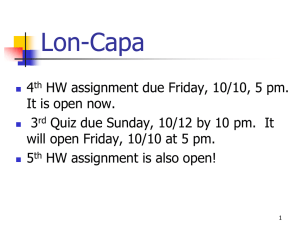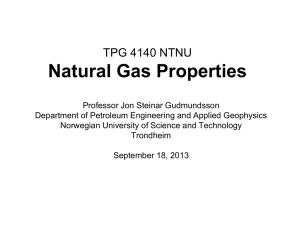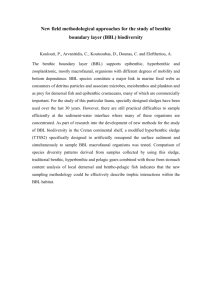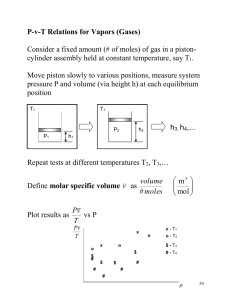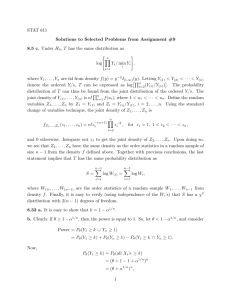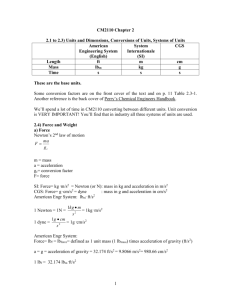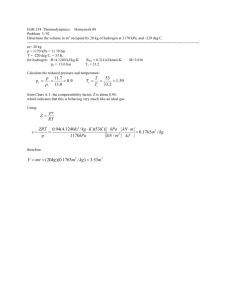Oil, gas and water are separated on an offshore platform
advertisement
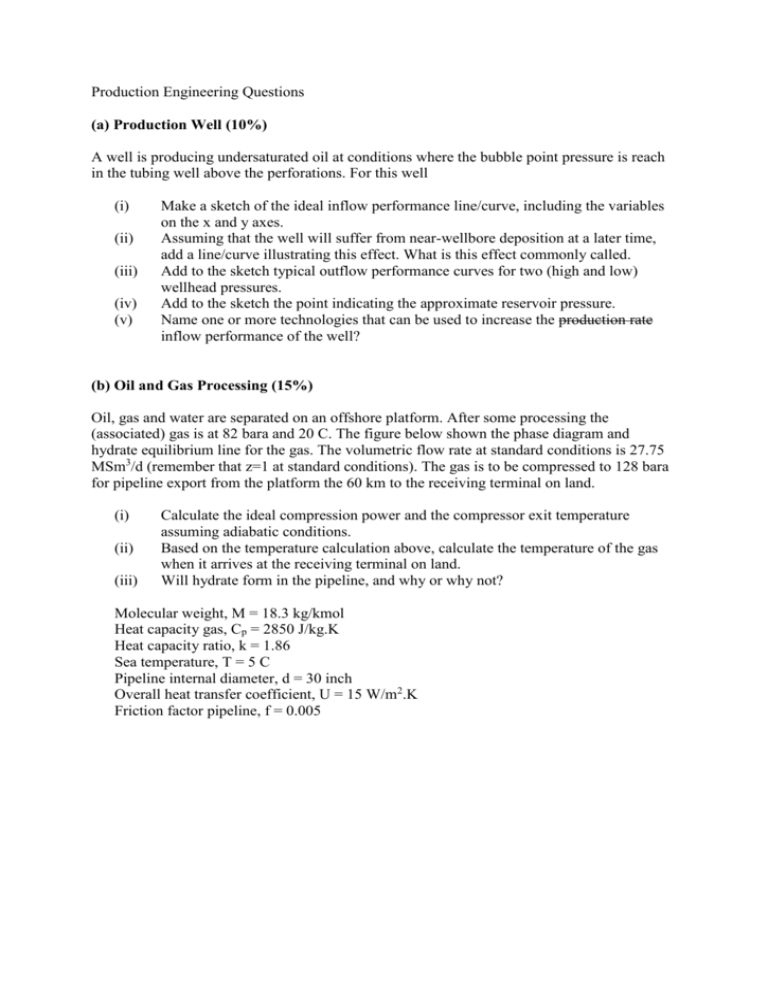
Production Engineering Questions (a) Production Well (10%) A well is producing undersaturated oil at conditions where the bubble point pressure is reach in the tubing well above the perforations. For this well (i) (ii) (iii) (iv) (v) Make a sketch of the ideal inflow performance line/curve, including the variables on the x and y axes. Assuming that the well will suffer from near-wellbore deposition at a later time, add a line/curve illustrating this effect. What is this effect commonly called. Add to the sketch typical outflow performance curves for two (high and low) wellhead pressures. Add to the sketch the point indicating the approximate reservoir pressure. Name one or more technologies that can be used to increase the production rate inflow performance of the well? (b) Oil and Gas Processing (15%) Oil, gas and water are separated on an offshore platform. After some processing the (associated) gas is at 82 bara and 20 C. The figure below shown the phase diagram and hydrate equilibrium line for the gas. The volumetric flow rate at standard conditions is 27.75 MSm3/d (remember that z=1 at standard conditions). The gas is to be compressed to 128 bara for pipeline export from the platform the 60 km to the receiving terminal on land. (i) (ii) (iii) Calculate the ideal compression power and the compressor exit temperature assuming adiabatic conditions. Based on the temperature calculation above, calculate the temperature of the gas when it arrives at the receiving terminal on land. Will hydrate form in the pipeline, and why or why not? Molecular weight, M = 18.3 kg/kmol Heat capacity gas, Cp = 2850 J/kg.K Heat capacity ratio, k = 1.86 Sea temperature, T = 5 C Pipeline internal diameter, d = 30 inch Overall heat transfer coefficient, U = 15 W/m2.K Friction factor pipeline, f = 0.005 Phase envelope and hydrate line for associated gas with molecule weight 18,3 kg/kmol (same gas as in table above). Pressure scale is from 0 to 120 bara. Equations (Production Engineering) q kA u dT dx k dp dr p pwf o qo Bo r ln 2kh rw q qs.c. Bo Bo V Vs.c. N p Bo V p ct ( pi pR ) ct c f S o co S wcw pR pi qo Bo t Act h 2kh( pR pwf ) qo re 3 / 4 s rw o Bo ln qo PI ( pR pwf ) pwf pR qg o qo Bo re ln 3 / 4 s 2kh rw pe Ts.c. 1 p dp re T ps.c. pwf g z ln 3 / 4 s rw kh p F ( p) z g p gL gM p po exp zRT L P qp k 1 m k p2 k P RT1 1 M k 1 p1 p T2 T1 2 p1 k k 1 k Cp Cv WI GCV T K x M 1 x Ud T2 T (T1 T ) exp L mC p p p f p g pa p f f L 2 u 2d d A2 M d p 22 2 2 p 2 p1 ln 2 L 0 f p1 f m 2 z RT f 0,316 Re 0, 25 Re ud 6,9 n k 1,11n 1,8 log n f Re 3,75d n = 1 for væske, n = 3 for gass 1 4 gd 3 fD uD uD ks uD L G G L G G gd 2 L G 18 G qG s.c. AG ks L G G qG AG k s p Ts.c. 1 p s.c. T z L G L G 6 0 , 58 pV znRT kg / m3 pM zRT p T z V Vs.c. s.c. p Ts.c. Bg (=FVF gass) = T ps.c. V z Vs.c. Ts.c. p M gass M luft M gass 28,96 R 8314 J 8,314 kJ / kmol K kmol.K Conversion Table Traditionally units LENGTH mile (mi) yard (yd) foot (ft) inch (in) VOLUME US-gallon (gal) UK-gallon (gal) API barrel (bbl) kubikkfot (cf) MASS pound (lbm) US-ton (ton) UK-ton (ton, tonne) TEMPERATURE Rankin (R) Celciusgrader (C) Fahrenheit (F) ENERGY, WORK kalori (cal) erg British Termal Unit (BTU) kilowattime (kwh) POWER hestekraft (elektrisk) (hk, hp) hestekraft (hydraulisk) FORCE dyn (dyn) kilopond, eller kilogramkraft (kp/kgf) poundforce (lbf) PRESSURE bar (bar) pound per square inch (psi) atmosfære (atm) mm kvikksølv (torr) VISCOSITY poise (p) centipoise (cp) lbf/(ft2/s) DENSITY API-gravity (API) g/cm3 lbm/US-gal lbm/UK-gal lbm/ft3 VOLUME FLOW liter pr. sek. (l/s) fat pr. dag (bbl/d) kubikkfot pr. dag (cf/d) US-gallon pr. minutt (gal/min) #: Exact value SI-equivalents M 1609.344 m # 0.9144 m # 0.3048 m # 0.0254 m # m3 0.00378541 m3 0.00454609 m3 0.158987 m3 0.0283167 m3 kg 0.45359 kg 907.185 kg 1016.05 kg Kelvin: K 5/9 K # K = C + 273 C = (F-32) ∙ 5/9 Joule: J 4.184 J # 10E-7 J 1055.06 J 3600 J Watt: W 746 W # 746.043 W Newton: N 10E-5 N # 9.80665 N 4.44822 N Pascal: Pa 105 Pa 6894.76 Pa 1.01325 bar # 133.322 Pa Pa.s 10E-1 Pas # 10E-3 Pas # 4.78803 Pas kg/m3 kg/m3 = (141.5)(1000)/(131.5 + API) 1000 kg/m3 # 119.826 kg/m3 99.7763 kg/m3 16.0185 kg/m3 m3/s 10E-3 m3/s 1.8401E-6 m3/s 3.2774E-7 m3/s 6.30903E-5 m3/s Useful info. 3 ft = 1 yd 12 in = 1 ft 1 bbl = 42 US gal 1 bbl ~ 5.62 cf R = F + 460 J = Nm W = J/s N = kg m/s2 dyn = g cm/s2 Pa = N/m2 1 bar ~ 14.5 psi 1 atm ~ 14.7 psi 1 atm ~ 1.01 bar Pa.s = kg/s.m poise = dyn/cm2 s
